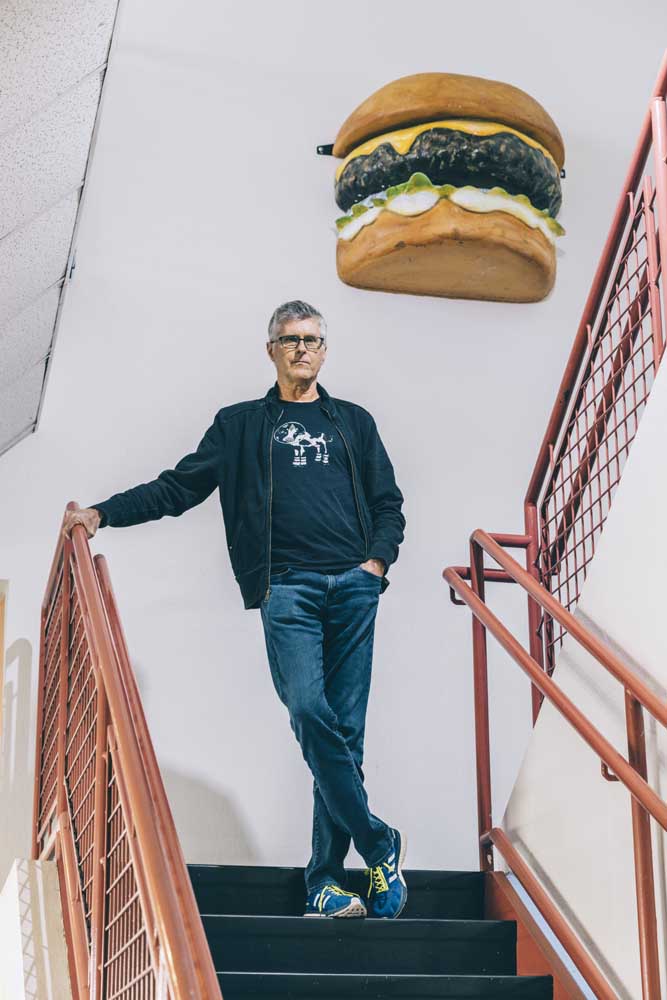Where’s the beef? It’s gone.
Published 12:00 am Tuesday, April 2, 2019

- Pat Brown, chief executive of Impossible Foods, in Oakland, California. Burger King is introducing a version of its iconic Whopper sandwich filled with a vegetarian patty from the California-based startup. (Matt Edge/The New York Times)
OAKLAND, Calif. — Would you like that Whopper with or without beef?
This week, Burger King is introducing a version of its iconic Whopper sandwich filled with a vegetarian patty from the startup Impossible Foods.
The Impossible Whopper, as it will be known, is the biggest validation — and expansion opportunity — for a young industry that is looking to mimic and replace meat with plant-based alternatives.
Impossible Foods and its competitors in Silicon Valley have already had some mainstream success. The vegetarian burger made by Beyond Meat has been available at over a thousand Carl’s Jr. restaurants since January, and the company is now moving toward an initial public offering.
White Castle has sold a slider version of the Impossible burger in its 380 or so stores since late last year.
But a national rollout at Burger King’s 7,200 locations would dwarf those previous announcements and more than double the total number of locations where Impossible’s burgers are available.
Burger King’s chief marketing officer, Fernando Machado, said that in the company’s testing so far, customers and even employees had not been able to tell the difference between the old meaty Whopper and the new one.
“People on my team who know the Whopper inside and out, they try it and they struggle to differentiate which one is which,” Machado said.
Burger King is initially making the Impossible Whopper available at 59 restaurants in the St. Louis area. Machado said the company had plans to quickly expand it to every branch in the country if everything in St. Louis goes smoothly.
“I have high expectations that it’s going to be big business, not just a niche product,” Machado said.
The fast-food chain has sold a veggie burger for years, but that was not ever intended to replicate the taste and experience of eating meat.
The Impossible Whopper creates an interesting alliance between a fast-food chain that promotes its devotion to beef on every Whopper wrapper (“100% Beef With No Fillers”) and a startup that is committed to getting people to stop eating beef.
Impossible Foods was founded in 2011 by Pat Brown, a former Stanford University professor, who became a vegan soon after college and founded his company with the explicit goal of decreasing the world’s reliance on animal agriculture.
Brown, who is 64, was motivated by his discomfort with the ethical, health and environmental costs of meat. But he said he came to believe that consumers would make a change only if they had a product that satisfied their cravings for beef.
“Our whole focus is on making products that deliver everything that meat lovers care about,” Brown said in an interview at Impossible’s production facility in Oakland, where he was wearing jeans and a T-shirt with a picture of a cow floating in space as an astronaut.
Several companies are now chasing plant-based foods that imitate meat. Beyond Meat has based its products on pea protein and beet juice, to give its burgers a bloody look.
Impossible’s biggest innovation has come from its use of heme, an iron-rich protein that the company believes is responsible for much of the distinctive taste of meat. Impossible found a way to cultivate heme from the roots of soybean plants and mass-produce it using yeast. The heme is blended with a combination of other vegetarian ingredients that are intended to have the slightly nutty texture of ground beef.
The company’s success has not been without controversy. A small but vocal group of environmentalists has said Impossible rushed its novel ingredients to market without adequate testing. At the same time, People for the Ethical Treatment of Animals slammed Impossible for testing its product on rats.
Cattle ranchers have also criticized Impossible for calling its product meat and have promoted state-level legislation that would limit how Impossible and other alternative meat companies can market themselves.
But Impossible has broadly delivered on Brown’s desire to create an environmentally conscious alternative to meat.
Meat production is one of the biggest single contributors to climate change and Impossible’s process creates just a fraction of the greenhouse gases that traditional beef burgers leave behind, according to an analysis commissioned by the company.
On the health side, the Burger King version of the Impossible burger will have about the same amount of protein as the regular Whopper, with 15 percent less fat and 90 percent less cholesterol.
The more important results for Impossible have come from early interactions with consumers.
After White Castle added Impossible’s food on a test basis in September, sales were strong enough that the chain announced in December that it would permanently add the Impossible slider to its menu.
“We beat our goals for this product,” said Kim Bartley, the chief marketing officer at the chain, which is based in Columbus, Ohio. “It was a nice surprise how many different kinds of customers wanted to try it.”






